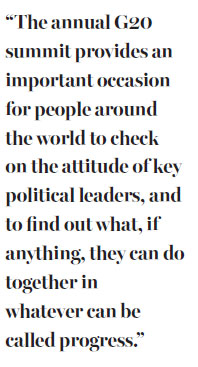It takes time to fix global system

What use is the G20? It could be a lot if countries are willing to seriously discuss ways to shape a new, healthier world economy
Top officials of the world's largest economies will meet in China on Sept 4 and 5 in what is called the G20 Leaders Summit.
Onlookers may wonder: What is the use? In a time of the lingering aftermath from the 2008 financial crisis, indeed what is the use of any occasion for politicians to keep talking about the need to do something but without giving rise to a shared agenda, even less a collective action plan?
There is some use, as China may point out. Now that it's eight years since the collapse of Lehman Brothers and the Wall Street meltdown, it is not difficult to tell, in retrospect, what all the globalist talk shops - from the G20 to international business seminars of various levels - have helped the world at least to avoid.

It is important that, so far, governments that represent more than 80 percent of the world's economic power have kept working to prevent a major setback in international business, or a full-scale trade war. There seems to have been an agreement on a bottom line, or on a few of the most dangerous things that politicians should avoid doing, such as excessive measures in competition and in trade protection.
All this is far from enough, admittedly, to help the world walk out of the shadow of 2008. As the radical critics would argue - from both left and right - the world economic pattern up to now still carries all the limitations of neoliberalism, an old ideological framework that has lost much of its luster.
But the question is, now that a recovery has proved so slow and painful, should politicians just toss away their bottom line? With so many people - middle class in the developed nations and the poor in developing nations - feeling bitter about the performance of neoliberalist economics, should the world beat a retreat?
Should the definition of economics be rewritten from trade-based prosperity into something else, say, a game for small, politically protected circles?
Should people who haven't benefited from the global market system, especially those in the underdeveloped corners of the world, give up their hope for opportunities from expanding business ties overseas?
The annual G20 summit provides an important occasion for people around the world to check on the attitude of key political leaders, and to find out what, if anything, they can do together in whatever can be called progress. For this purpose, China is likely to make a contribution this year by pledging more effort in mitigating climate change.
It will take a long time to develop a replacement for the economics that didn't seem to do such a good job. More often than not, changing a basic idea is more difficult than rebuilding a government. And in practice, for a new brand of economics to start to work, such as involving more people in poor countries in the global business game, it requires many governments to build new functions. It's just like what the Chinese government is trying to do in what it calls a transition in the new normal.

Things to be covered by the would-be replacement economics would include:
More collaboration between public and private investors;
More ways for financial businesses to serve the real economy and common people, to avoid creating a small independent class of financial capital out of touch with the rest of society;
More cities with affordable housing and accessible services;
More countries ready to receive foreign investment and to produce for the world market - with effective rule of law and capable government;
More policy-based measures to avoid internal inequality, especially in education, medical care and social security;
A more effective global governance system in free trade and anti-corruption measures.
For the foreseeable future, all world leaders and all who want to be world-class leaders will have to keep sharing their views and comparing notes about these, in G20 and in all similar occasions, before they can grow from ideas into realities.
That may not sound like a very effective solution, certainly not a quick solution. But what kind of politics can the world expect to help it walk out of the shadow of the last financial crisis - and the danger of repeated ones?
The author is an editor-at-large of China Daily. Contact the writer at edzhang@chinadaily.com.cn
(China Daily Africa Weekly 09/02/2016 page13)
Today's Top News
- Foreign ministers of China, Egypt call for Gaza progress
- Shield machine achieves Yangtze tunnel milestone
- Expanding domestic demand a strategic move to sustain high-quality development
- Xi hears report from Macao SAR chief executive
- Xi hears report from HKSAR chief executive
- UN envoy calls on Japan to retract Taiwan comments






























